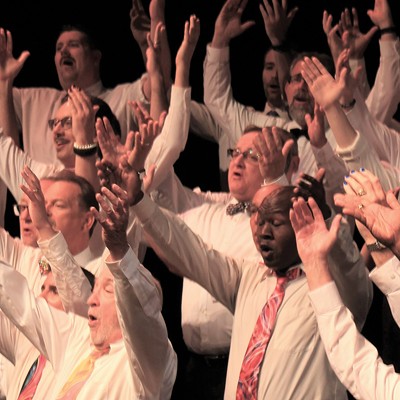Witty wordplay and a gentle rebuke of the moneyed class of early 20th-century England are characteristic of the delightfully wicked sensibility of Noël Coward, a playwright who is still able to make us smile almost 100 years after his heyday.
Fortunately, his plays are often pulled off the shelf and given life on stages today, where we can rediscover this writer's wonderful ability to create endearing characters, as well as his dexterous playfulness with his mother tongue.
The Arizona Repertory Theatre at the University of Arizona has mounted a respectable version of Coward's Hay Fever. The cast is stocked with young actors-in-training who manage to breathe life into characters often much older than they are. At the same time, they get an opportunity to perform a period piece that requires them to wrap their tongues around Coward's words—in a British accent to boot.
The group is largely successful in delivering the essence of Coward's play. As directed by Stephen Wrentmore, the story, simple as it is, moves at an effective clip, which is absolutely necessary to make the piece work.
The Bliss family is rather unconventional; described by an acquaintance as a "slap-dash family," the Blisses themselves agree that this is a fairly accurate description. Father David is a novelist; mother Judith is a retired (sort of) actress; and grown children Sorel and Simon have certainly not fallen far from their parental tree. These are artsy folks given to excesses in numerous ways.
On a summer weekend at their country home, they have each, without the knowledge of the others, invited a visitor. When the family discovers that a veritable crowd will be gathering, some are annoyed, either because a particular guest might be undesirable, or because the full house will change the dynamics of their weekend plans.
Predictably, the guests are unaware of—and unprepared for—the setting into which they arrive. One Bliss might be interesting enough to deal with; engaging with the entire eccentric group proves to be confusing, taxing and, ultimately, overwhelming. After an evening of parlor games gone awry, and puzzling histrionics by Judith assisted by her offspring, the visitors agree that the Bliss home offers not so much bliss as bewilderment—and that a mass exodus might be in their best interests.
Coward's piece is a featherweight comedy in which success depends on well-executed characterizations, and ART's young group performs admirably.
Sorel (Georgia Harrison) and Simon (Taylor Rascher) open the play, and they have a formidable task: They need to draw us in and establish a context for the ensuing story, and they do this within a lengthy scene which relies on banter rather than overt action. In addition, they need to do this in a linguistic style and accent with which we are not yet familiar. Consequently, it takes us a while to get the hang of the language and grab on to the setup. Harrison does well here and throughout, but her character is a bit bland. Rascher, on the other hand, goes in another direction, leaping and sliding across the stage in a rather ADHD fashion. As an actor, he totally commits to this excess, but he almost becomes annoying rather than endearing.
Joe Hubbard portrays David, dear old Dad, who we encounter for the first time late in the first act, when he comes downstairs in his skivvies and an open robe. Hubbard does a solid job, absent-mindedly occupying the periphery of the family circle as he focuses on the novel he is writing.
But the choice familial role belongs to Judith, a grand dame who fills the stage with a huge, overwrought presence. It is a plum role for an actress, having been fleshed out by the likes of Edith Evans, Shirley Booth, Judi Dench, Rosemary Harris and Diana Rigg. Here, Megan Davis gives Judith a delightfully competent reading. She fills the stage: When she makes an entrance, others, even those possessing a fair share of eccentricity, pale in her presence. For such a young actress, Davis impresses.
The guests also offer an array of personalities, and Michelle Luz as Myra, and Owen Virgin as Sandy Tyrell both contribute well. Chris Karl in particular gives us a fully drawn characterization, creating the diplomat Richard Greatham. Caitlin Stegemoller as Jackie—big-boned and feeling utterly out of place—gives our hearts a tug.
Students are also responsible for the major design elements. Michelle A. Bisbee's set combines an understated elegance with Art Deco accents; the result is attractive and works well, giving us a clear idea of where we are. Adam Espinoza's costume design was a master's-thesis project, and the well-researched and skillfully executed period fashions help us understand who each of these characters are.
Overall, ART's Hay Fever is a capably done production, particularly considering the youth of those involved; the group displays talent and skill. This may not be one of Coward's best plays, but ART does it well enough to offer an entertaining show.








